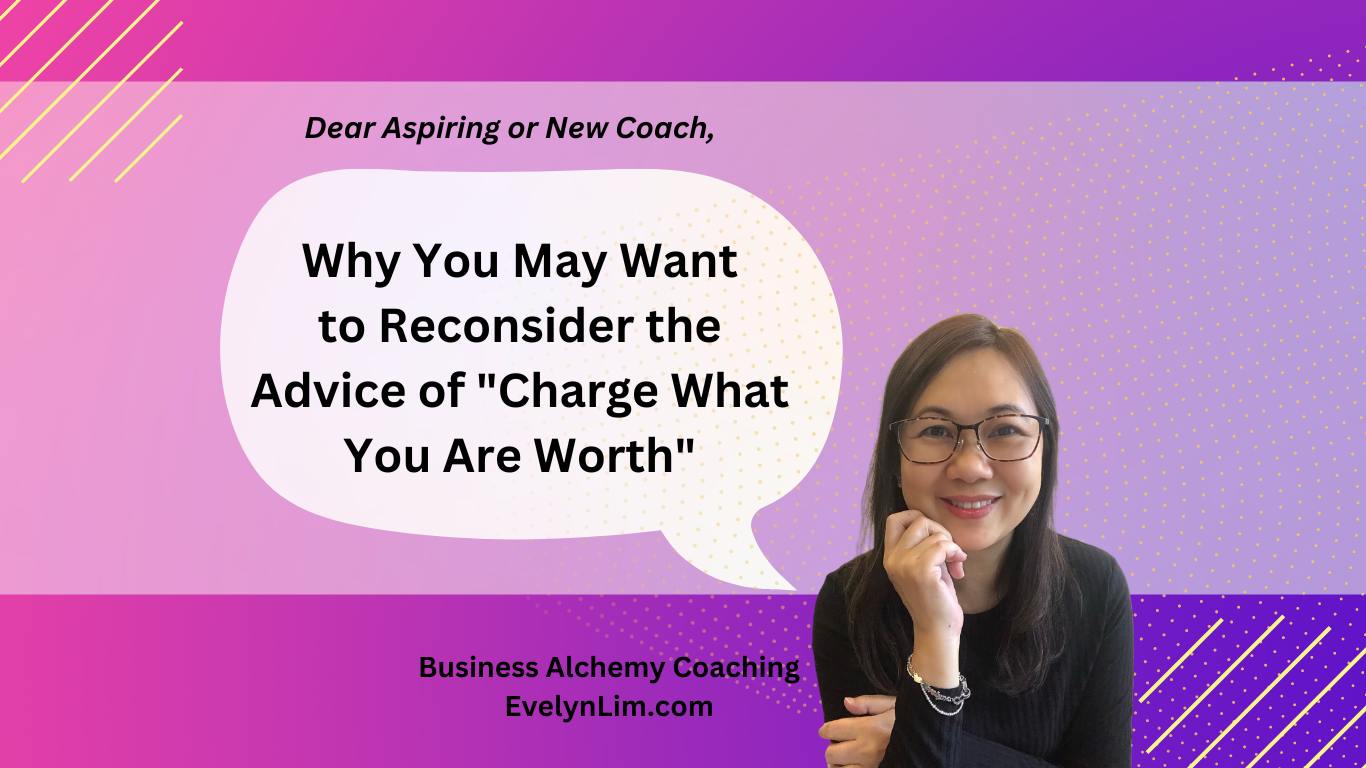Why You May Want to Reconsider the Business Advice of “Charge What You Are Worth”

Many business coaches often have the advice of “charge what you are worth” when it comes to pricing your coaching services. Even though you could be in the midst of getting your business off the ground, they may still recommend that you charge high prices for your time. They assure you that you are worthy and deserving and that at the soul level, you are also of infinite worth. Hence, you are justified to raise your prices since you are “more than enough”.
Admittedly, such advice can stoke anyone’s ego. And since they are your business coaches, you may decide to take their advice by charging a high hourly rate. Yet, in reality, this advice may not be helpful especially if you are not backed by adequate coaching experience or have not been able to generate enough business.
Let’s examine what it means to “charge what you are worth”, so that we can make better sense of the advice.
Evaluating “Charge What You Are Worth”
That you are worthy is, indeed, the divine truth. You are worthy of love, care and respect. Everyone is, no exceptions.
However, in reality, pricing based on worth is a lot more tricky.
For a start, no one can pay you an infinite amount even though you are of infinite worth. I would think that it is impossible to put a price tag on someone’s worthiness. If you price your services at a higher rate, does it make you more worthy than your colleague?
Also think about the scenario where your prices are on the higher end. You may end up working with fewer people or you risk pricing yourself out of the market. Additionally, to justify your high prices, you may have to hustle a lot more. In short, while you have a soul-level awareness of your infinite worth, pricing considerations have to be made differently here on Planet Earth.
From what I see, “charge what you are worth” promotes the risk of cultivating an entitlement mindset. Having a sense of entitlement creates the expectation that you are deserving without necessarily putting in an equivalent amount of effort or work. Now, everyone knows that starting our own coaching business involves a learning curve and we get better with experience when handling more clients. Hence, having an entitlement mindset can set you back. It is possible that you may have to lower your prices if you have charged them too high too soon.
On the contrary, I believe in applying authentic practices for our business. We do not make guarantees or promises that we can’t keep to our clients. Also, I’d like to propose that we make the distinction between having an entitlement mindset and a deep awareness that we are worthy and deserving. An entitled mindset is focused on what you believe that you are owed while an awareness that you are worthy is about recognising that you have inherent value without imposing on others.
I recall a time when I had to respond to a business coach on how much I was charging. He had asked me pointedly in front of a group of coaches. When I shared what my hourly rate was, I could sense as if the whole room went into silence. My face burnt with embarrassment as I was shamed openly for not charging more. He made it seem that I had based my prices on a low perception of my own worth.
Well, that business coach is no longer running his consulting business. When he pitched his upsell, no one bought his high-ticket program. He was a new business coach, and we weren’t sure about what more we could learn from him.
I prefer a more realistic approach when it comes to pricing offers. Instead of following the advice of “charging what you are worth” blindly, I suggest doing some research. In other words, find out what the market is charging. I recommend charging a reasonable prices based on experience and skills and the niche you are in. You don’t want to underprice yourself either.
Admittedly, since there is a range in prices that coaches can offer, you may still be unclear about what to charge. My proposal is sit quietly and check in physically while contemplating on the amount that you wish to charge. Make sure your pricing sits comfortably with you, not too low nor too high. You are able to pay for your expenses while doing the business that you love 🙂
It is likely that if you charge a price lower than one based on “charge what you are worth”, more people will be able to take up your affordable services. Should you be hoping to gain experience from working with more clients, this is not a bad idea. After all, you have started your heart-centred business with the intent of making a difference.
Just to add, I occasionally offer compassionate pricing in situations where I am aware that my clients are struggling financially or where they come from a developing country. It’s something worth considering if we are in a position and have the time to help another person. Some business coaches encourage their clients to borrow money to “invest” into their high-priced packages. While I believe in investing for personal growth, I prefer not to put my clients into huge debt just to pay for my coaching services. Hence, my reasons for charging a compassionate price is not based on a low perception of my own worth, so to speak.
Indeed, the more people you can work with, the greater the difference you can create. Once you have built up your experience and have a waitlist of clients, you can gradually raise your prices. You will know it when the time comes!
Much love and abundance always,
Evelyn Lim
Business Alchemy Coach


